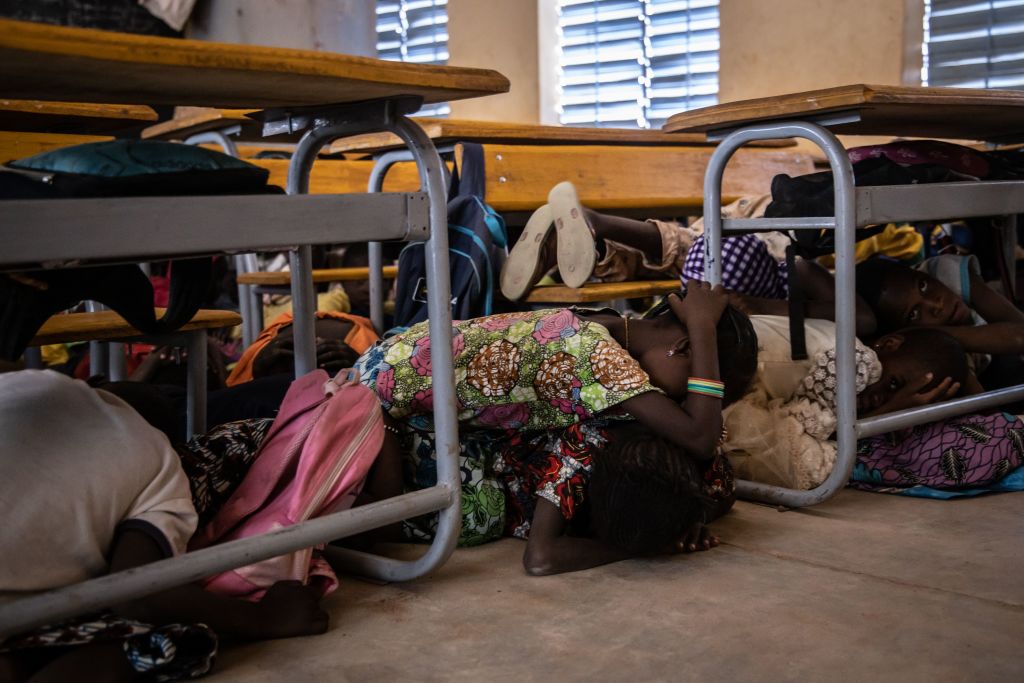ADF STAFF
Armed groups in Niger have increasingly targeted schools to try to recruit new members and destabilize the country. In 2023, more than 920 schools in the Tillabéri region alone were closed due to security concerns.
In the southwestern department of Abala, officials closed 41 schools, 31 for security reasons and 10 due to a lack of teachers, according to Boubacar Oumarou, Abala’s prefect.
“When teachers leave, the schools inevitably close,” Oumarou told Global Voices. “This doesn’t bode well for us since we have thousands of students. Around 3,000 are currently hanging around.”
The affected schools were mostly in the tri-border area Niger shares with Burkina Faso and Mali.
Throughout the Sahel region, extremist groups linked to al-Qaida and the Islamic State group have adopted a strategy previously used by Boko Haram: attack schools, kill teachers and students, and target children for recruitment.
In 2014, Boko Haram attacked a school in Chibok, Nigeria and abducted 276 schoolgirls, sparking a surge of similar attacks. Today, teachers and students in areas impacted by extremism endure daily panic when schools are open.
“As well as this loss of life, there is also physical trauma,” Souleymane Badienne, secretary general of Burkina Faso’s Federation of National Teachers and Researchers Unions, told Global Voices. “Some have been hunted down and sometimes even beaten in front of their students. There’s also the psychological trauma.”
Armed terrorist groups killed 17 educational professionals in Burkina Faso in 2023. Since attacks on Burkinabè schools were first reported in 2017, the number and severity of such attacks have increased.
“It’s their war against education,” one teacher told Human Rights Watch (HRW).
As of September 2023, a quarter of Burkinabè schools were closed, affecting 1 million students, according to a report by New Lines Institute, a think tank.
The situation is worse in towns seized by militant groups. In the blockaded town of Pama, only two of eight schools are still open, and there are just six teachers working to educate more than 1,000 students.
Boureima S. was a 14-year-old student in the Burkinabè village of Béléhédé when armed men on motorcycles attacked his school in 2018.
“I was in class when the terrorists came. … They fired a shot, and we all fled to save ourselves,” said Boureima S., who spoke to HRW using a pseudonym. “Afterwards, when we went back there, I saw they had burned the principal’s motorcycle … the [school’s] office … and the students’ notebooks.”
The attacks are part of a concerted strategy to aid terrorist recruitment. A 2023 U.N. Development Programme report found that most new recruits into armed groups are from rural areas and have low education levels.
In the Lake Chad region, youth illiteracy rates are at 70%, according to New Lines Institute. Lower literacy rates limit opportunities for young people to join the formal economy and find work, leading some young people to join extremist organizations.
“Falling literacy rates have chronically destabilized the region and complicated the long-term paths to progress for youths,” New Lines Institute researchers wrote. “As more and more students are removed from school and the population in Africa continues to grow, access to education will be vital in fighting extremism.”
There is some evidence that insurgent groups in Central Africa are now using this strategy. In the Democratic Republic of the Congo, escalating extremist violence mostly affects students in the North Kivu and Ituri provinces. In the 2022-23 school year, violence by armed groups forced more than 2,100 schools to close and deprived 750,000 children of education, New Lines Institute reported.
“Without proper education, adolescents are left with minimal resources and opportunities for growth and development, leaving them to search for other opportunities for community and employment — one of the main reasons individuals join violent extremist groups,” New Lines Institute researchers wrote.

